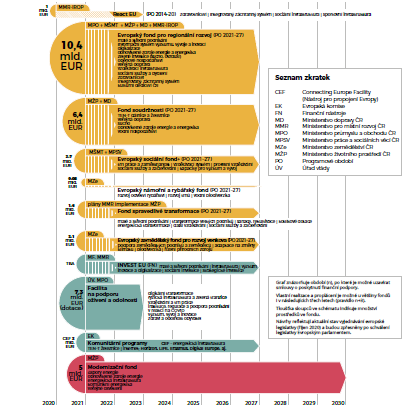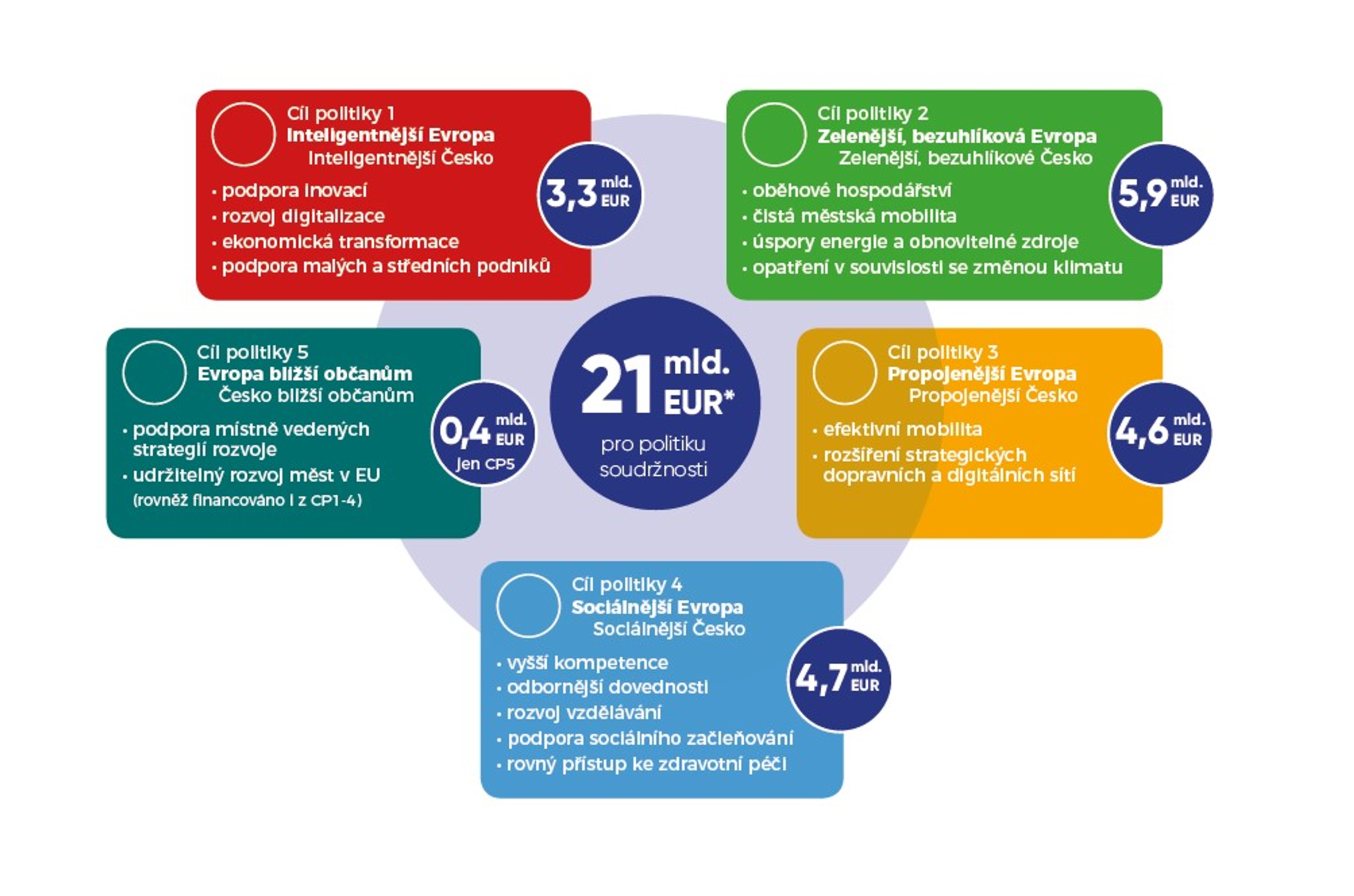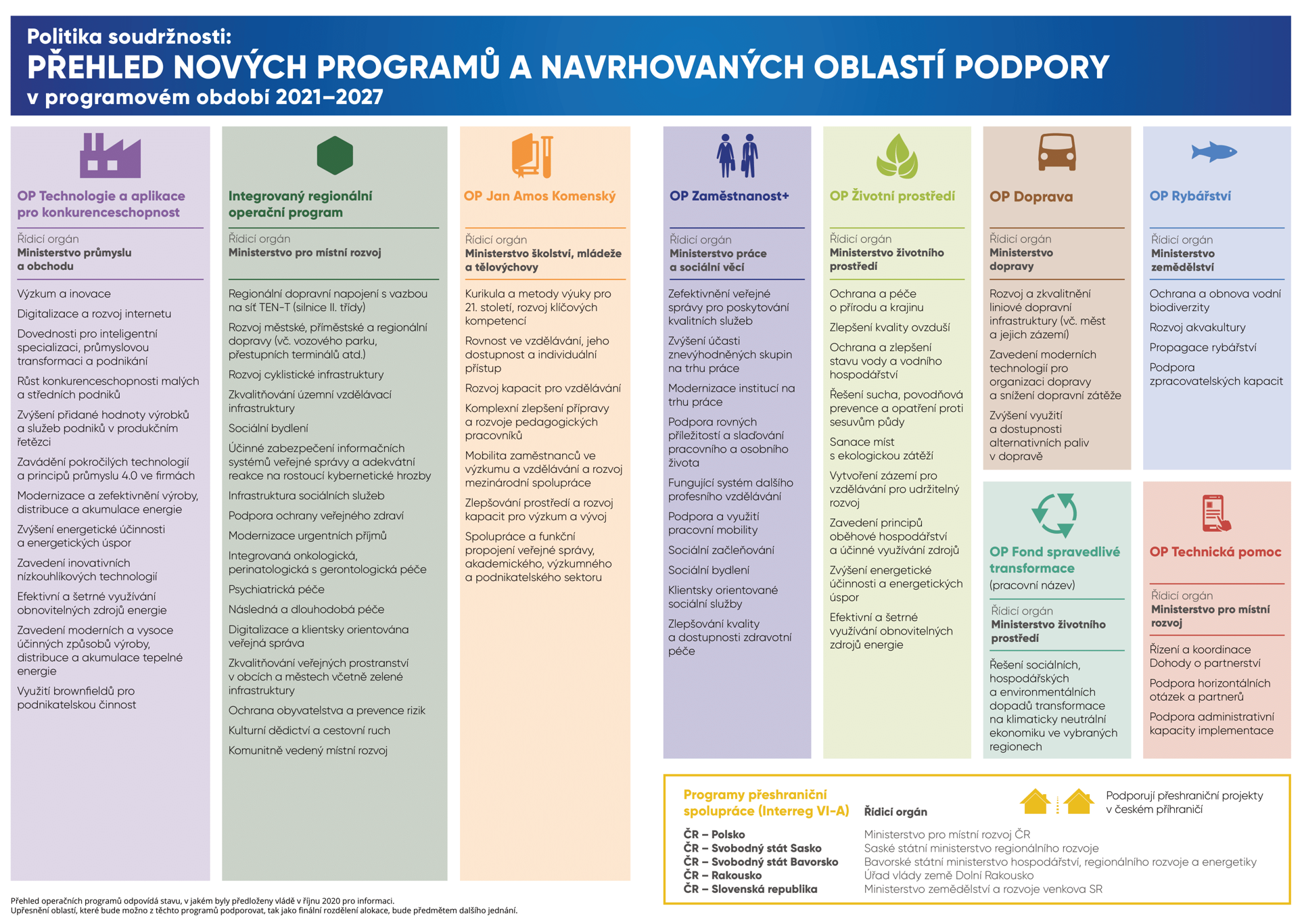Despite the fact that the programs and projects of the “old” programming period 2014–2020 will be gradually closed until 2023, intensive preparations are underway for the “new” programming period 2021–2027.
After 2020, the Czech Republic will be able to use the money from many European funds and initiatives. Whether in the form of non-repayable subsidies or through other financial instruments – such as soft loans. Applicants will be able to apply for support for their projects either under the operational programs that follow on from the current period or under the new instruments, which fall under the collective name Next Generation EU.
Priorities and objectives for the program period 2021-2027
The priorities of cohesion policy for the 2021-2027 programming period have been reflected in five objectives proposed by the European Commission, each focusing on a different area of EU investment policy. The structure of operational programs and the list of supported areas in the 2021–2027 programming period are based on these priorities and objectives.
In this context, the Ministry of Regional Development has prepared a LEAFLET, which clearly presents the five main objectives of the new programming period.
Source: MMR ČR
In this leaflet HERE you will also find more detailed information about the financial resources that currently fall inder individual goals, and through which channels it will be possible to draw them.
Programs for the period 2021-2027 co-financed by the European Structural and Investment Funds
Overview of programs in the period 2021-2027, which are co-financed by the European Structural and Investment Funds (ESIF).
National operational programs
Definition of individual operational programs and proposed areas of support.
Source: MMR ČR
OP Technology and Applications for Competitiveness, managed by the Ministry of Industry and Trade;
OP Jan Amos Komenský, managed by the Ministry of Education, Youth and Sports;
OP Employment +, managed by the Ministry of Labor and Social Affairs;
OP Transport, managed by the Ministry of Transport;
OP Environment, managed by the Ministry of the Environment;
Integrated regional operational program, managed by the Ministry of Regional Development;
OP Fair Transformation Fund, managed by the Ministry of the Environment;
OP Technical Assistance, managed by the Ministry of Regional Development;
OP Fisheries, managed by the Ministry of Agriculture
In addition to the above-mentioned programs, the Ministry of Agriculture will submit a draft rural development program separately, which will be outside the cohesion policy in the future – the rural development program will change to the Strategic Plan of the Common Agricultural Policy of the Czech Republic in the new programming period.
Cross-border cooperation programs
Interreg V-A Czech Republic – Poland, coordinated by the Ministry of Regional Development;
Interreg V-A Slovak Republic – Czech Republic, coordinated on the territory of the Czech Republic by the Ministry of Regional Development;
Interreg V-A Austria – Czech Republic, coordinated on the territory of the Czech Republic by the Ministry of Regional Development;
Cross-border Cooperation Program Czech Republic – Free State of Bavaria, coordinated on the territory of the Czech Republic by the Ministry of Regional Development;
Cooperation program of the Free State of Saxony – Czech Republic, coordinated on the territory of the Czech Republic by the Ministry of Regional Development
Transnational and interregional cooperation programs, coordinated in the Czech Republic by the Ministry of Regional Development
Next Generation EU
Next Generation The EU is a € 750 billion temporary recovery tool to help repair the immediate economic and social damage caused by the coronavirus pandemic. Europe will return from the COVID-19 pandemic greener, more digital, more resilient and better adapted to current and future challenges.
Distribution of Next Generation EU funds
| The National Recovery Plan and the Recovery and Resilience Facility | € 672.5 billion |
| of which loans | € 360 billion |
| of which grants | € 312.5 billion |
| ReactEU | € 47.5 billion |
| Fair Transformation Fund (FST) | € 10 billion |
| Horizon Europe | € 5 billion |
| InvestEU | € 5.6 billion |
| Rural development | € 7.5 billion |
| RescEU | € 1.9 billion |
| TOTAL | € 750 billion |
Source: European Council conclusions of 21 July 2020
The National Recovery Plan and the Recovery and Resilience Facility
In the original Recovery and Resilience Facility (RRF), the central element of the EU’s Next Generation instrument is the € 672.5 billion in loans and grants that will be available to support reforms and investments by EU countries. It is the largest channel in the Union’s recovery plan Next Generation EU.
The total allocation of the RRF is EUR 672.5 billion, of which EUR 360 billion is for loans and EUR 312.5 billion for grants. The stated amounts are in constant prices in 2018. In current prices (i.e. after taking inflation into account) there will be approximately EUR 338 billion available for grants. The preliminary estimated allocation of funds for grants for the Czech Republic amounts (according to macroeconomic forecasts) to approximately EUR 7.1 billion (in current prices). Member states may also draw additional soft loans for additional reforms and investments of up to 6.8% of gross national income (GNI) in 2019. There is no compulsory national co-financing when drawing from the RRF.
The aim is to mitigate the economic and social impact of the coronavirus pandemic, increase the sustainability and resilience of European economies and societies, and prepare them for the challenges and opportunities of ecological and digital transformation.
To draw funds from the RRF, each member state is required to prepare a recovery and resilience plan (National Recovery Plan) in the form of a package of measures to implement and public investments. In the Czech Republic, its guarantor is the Ministry of Industry and Trade.
In simple terms, the current (January 2021) content of the NPO can be presented in the following graphics showing the individual components to which financial support from the RRF will be directed:
| 1. Digital transformation | 3. Education and the labor market |
| 1.1 Digital services for citizens and businesses | 3.1 Innovation in education in the context of digitization |
| 1.2 Digital systems of state administration | 3.2 Adaptation of capacity and focus of school programs |
| 1.3 Digital high-speed networks | 3.3 Modernization of employment services and development of the labor market |
| 1.4 Digital economy and society, innovative start-ups and new technologies | 4. Institutions and regulation and business support in response to COVID-19 |
| 1.5 Digital transformation of enterprises | 4.1 Systematic support for public investment |
| 1.6 Development of the cultural and creative sector | 4.2 Support for investment in industry and business |
| 1.7 Speeding up and digitizing construction management | 4.3 Promoting compensation in crisis-affected sectors |
| 1.8 Digital approach to justice | 5. Research, development and innovation |
| 1.9 Digital access to archives | 5.1 Excellent research and development in priority areas of public interest in health care |
| 2. Physical infrastructure and green transition | 5.2 Support for research and development in companies and the introduction of innovations into business practice |
| 2.1 Sustainable and safe transport | 6. Health and resilience of the population |
| 2.2 Reducing energy consumption | 6.1 Increasing the resilience of the healthcare system |
| 2.3 Transforming industry and switching to cleaner energy sources | 6.2 Prevention of oncological diseases |
| 2.4 Developing clean mobility | |
| 2.5 Renovation of buildings and air protection | |
| 2.6 Nature protection and adaptation to climate change | |
| 2.7 Circular economy and recycling and industrial water | |
| 2.8 Brownfield recovery |
It can be expected that the NPO ČR will be approved in the middle of 2021, but measures (reforms and investments) that were launched from the beginning of February 2020 and were subsequently included in the approved NPO are eligible for funding from the RRF.
The support is paid out from the RRF retrospectively after reaching the individual milestones and ex ante objectives set out in the NPO on the basis of payment claims. Payment applications may be submitted by member states no more than twice a year. Member states may send the last request to the European Commission by the end of August 2026. The last payment from the RRF must be made by the end of 2026 at the latest.
REACT-EU
“Recovery Assistance for Cohesion and the Territories of Europe” – these are exceptional European resources up to the 2014-2020 programming period to help support the recovery from the COVID-19 pandemic and to prepare for a green, digital and resilient recovery.
In the Czech Republic, these funds will be distributed within the Integrated Regional Operational Program 2014-2020 (IROP 2014-2020) within the newly created specific objective (SC 6.1 REACT-EU and SC 7 priority axis in this program), while the total funds for the Czech Republic reach up to 1 billion euros.
Projects in all proposed areas will be implemented throughout the Czech Republic, including the capital city Prague and the supported areas include:
- Healthcare (devices and buildings)
- Integrated rescue systems
- Social infrastructure with increased energy efficiency
- Technical support
MODERNIZATION FUND
Is the new EU financial channel for 2021-2030 created along the lines of the EU’s ambitious climate target, aimed at supporting investment in modernizing energy systems and improving energy efficiency.
The Modernization Fund draws funds mainly from the monetization of 2% of the total number of emission allowances in the EU ETS for the period 2021-2030. It focuses on the following priority areas in the perspective of sustainable technologies:
- production and use of energy from renewable sources,
- energy efficiency,
- energy storage and distribution equipment.
The European Commission also lists the Modernization Fund in a strategic package called the Green Agreement. This document was presented by the European Commission at the end of 2019. The Modernization Fund is presented here as one of the channels focusing on climate and energy, which contributes to ensuring the EU’s transition to a more sustainable economy.
The expected allocation for the Czech Republic is approximately CZK 120–150 billion and the fund is administered by the State Environmental Fund.
It will be possible to draw funds from the Modernization Fund in the Czech Republic in the next 10 years. The implementation of the Modernization Fund takes place through 9 separate programs, within which specific forms and conditions of support will be determined. The setting up of these programs is currently the subject of intensive negotiations and discussions.
You can find more information HERE.





